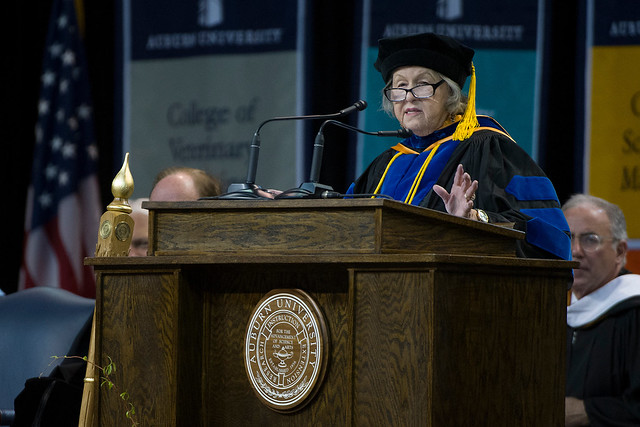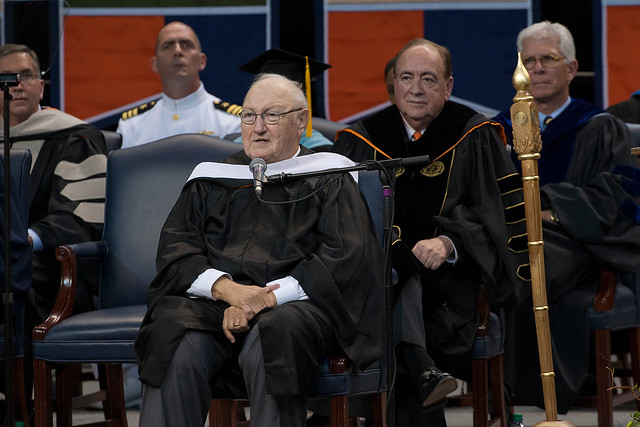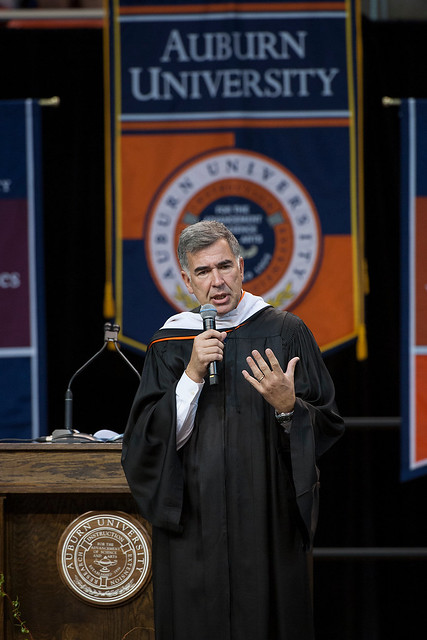Gogue gives final sendoff to Auburn graduates, speakers offer advice to new alumni
Article body
Auburn University President Jay Gogue shook the hands of graduates during the spring 2017 commencement ceremonies May 6-8, marking the final graduating class under his 10-year tenure as president.
To honor Gogue's last commencement ceremonies as Auburn's president, many speakers recognized the work he has done to better Auburn. Trustees Bob Dumas, Elizabeth Huntley and Michael DeMaioribus were among those who offered gratitude for Gogue and his wife, Susie.
"We appreciate that you are leaving our university in better shape than you found it. Thank you, Dr. Gogue," DeMaioribus said.
For the first time in school history, Auburn University held five ceremonies to award 3,563 degrees, in addition to the College of Veterinary Medicine and the Harrison School of Pharmacy ceremonies.
Auburn University awarded John W. and Rosemary Kopel Brown, both 1957 graduates, with honorary doctor of science degrees. The Browns have exemplified extraordinary excellence and character throughout their lives–John, through his business leadership and accomplishments, and Rosemary, through her teaching career and commitment to education, community service and support of the arts.
Leah Rawls Atkins
Three-time Auburn University graduate Leah Rawls Atkins delivered the commencement addresses Saturday. She holds the distinction of earning the first doctorate of philosophy granted by the Auburn University Department of History, was the first woman to be inducted into the Alabama Sports Hall of Fame and is a former U.S. National and World Champion water skier.
As Auburn celebrates its 125th year of women on campus, Atkins wove the theme of women through her speech, recognizing both the challenges women faced and also their accomplishments and breakthroughs.
When Atkins was within a quarter of graduation, a professor recommended that she apply for a graduate assistantship in the Department of History to begin work on her master's degree. However, she had to complete a form that asked her what she wanted to do with a master's degree in history.
"Professor Robert Rea told me not to write that I wanted to continue in graduate school and earn a Ph.D. in history because there were men in the department who did not believe women should teach history on the college level," she said.
After graduating with her master's and shortly before signing a contract to work with Auburn City Schools, Atkins was offered the opportunity to teach freshmen U.S. History at Auburn University. She later went on to earn her doctorate in history and taught at the University of Alabama at Birmingham and Samford University.
"I traveled far on my improbable journey," she said. "To complete it, I had to work harder, use my time more efficiently, push myself constantly, learn to function with less sleep, go over notes and materials many times," she said.
Atkins left the graduates with some reminders of how to make the most of their Auburn degree.
"Stay close to Auburn," she said. "Come back when you can. Join all those many Auburn people who have loved Auburn as you do, have appreciated their education and the special friends they made. Stay close simply because you love Auburn University, and it has given you the preparation for success and the best days of your life—so far!"
David Housel
Former Athletics Director David Housel addressed graduates at Sunday's commencement ceremonies. He told the graduates to never give up on four things: themselves; their fellow men and the power of forgiveness; learning; and Auburn.
Housel cited President Gogue as an example of why the graduates should always believe in themselves.
"Forty-eight years ago, a young man named Jay Gogue from Waycross, Georgia, sat where you are sitting in a building not too far from here, waiting to receive his degree in horticulture," Housel said. "Never in his wildest dreams and imaginations did he think he would be sitting here today as president of his alma mater."
Housel encouraged the graduates to trust their life journey and to "forgive and forget" when interacting with others. He said that forgiving allows people to live without the past robbing them of their joys and happiness.
"Never give up on your fellow man," he said. "We are not perfect and you are not perfect, but together you can accomplish great things. Accomplish those great things."
In order to be successful, graduates must continue to learn, Housel said.
"The degree you received does not mean you have all the answers," he said. "It means that you have successfully completed a course of study designed to help you know where and how to start looking for the answers."
His final piece of advice for the graduating class was, "Don't give up on Auburn."
"Believe in Auburn," he said. "Love it and make it better for those who follow you. Make Auburn better."
Mark Winne
Mark Winne, an investigative reporter for WSB-TV in Atlanta, spoke during Monday's commencement ceremony. Winne began by reflecting on coming back to school in 2013 to finish his degree after leaving in 1979 before graduation to accept a job offer. He joked about being "on the 38-year plan" and said he graduated one semester after his oldest son. Through anecdotal tales of his career as a journalist, Winne offered seven pieces of advice that he believes will carry the graduates through their own careers.
"Be open to the mentor, the person who can change the course of your life," he said.
He recalled the late Jack Simms, who returned to the Plains after serving in World War II, to build the Department of Journalism at Auburn.
"He took this Air Force brat who grew up all over the place who really had no roots and put a lot of extra work in him and was there for every big career decision from then on," he said.
Winne cautioned the graduates about the use of emails, text messages and phone calls and reminded them of the oftentimes forgotten method of communication.
"Face-to-face contact can make all the difference," he said.
His other advice to the graduates included learning how to forgive, having courage and believing in miracles.
"My wife, a nine-time cancer survivor, may be the most courageous person I know," he said. "Courage brings me to number five: believe in miracles. They happen, I've seen it. There's no mathematically plausible explanation for her still being here besides a true power-of-prayer style miracle."
His sixth message to the graduates brought laughs from the graduates: don't let the haters get you down.
For his final charge to the graduates, Winne quoted Romans 8:28.
"All things work together for the good of them that love the Lord and are called according to His purpose," he said. "I'm ashamed to say I didn't learn about that in Sunday School, I learned about that on a story."
He told the story of Senator Ralph David Abernathy III, the son of the one of the most influential preachers in American history, who landed in prison. Winne covered Abernathy's prison time at length, but years later the two became close. Abernathy eventually became a preacher himself before developing terminal cancer. Winne attended one of his sermons about a month before he died, where he heard Abernathy's mother lament over how unjust it was that her son had gone to prison for a relatively minor infraction while others get away with much worse.
"Ralph said, and I'll never forget it, 'But mama, I met God in prison.' All things work together," Winne said.
Winne finished by challenging the graduates to ask themselves a question: "Whatever your chosen profession, I want you to dig deep, look into your heart and ask yourself why? Why am I going to do it? And I'll give you a hint: the right answer does not involve overuse of the first person pronoun."
He warned of the dangers of using ego or money as the answer to why because sometimes those cause bigger problems.
"At the end of the day, if you want to find real satisfaction, it has to be because you used the gifts God gave you in your particular combination to help other people," Winne said. "If you can find the way you can use your particular suite of gifts to help other people and you can make your living doing it, then you found your calling in life. There's no ego boost that can compare to that."
Related Media
Media interested in this story can contact Communications Director Preston Sparks at (334) 844-9999 or preston.sparks@auburn.edu.
Auburn University is a nationally ranked land grant institution recognized for its commitment to world-class scholarship, interdisciplinary research with an elite, top-tier Carnegie R1 classification, life-changing outreach with Carnegie’s Community Engagement designation and an undergraduate education experience second to none. Auburn is home to more than 30,000 students, and its faculty and research partners collaborate to develop and deliver meaningful scholarship, science and technology-based advancements that meet pressing regional, national and global needs. Auburn’s commitment to active student engagement, professional success and public/private partnership drives a growing reputation for outreach and extension that delivers broad economic, health and societal impact.







